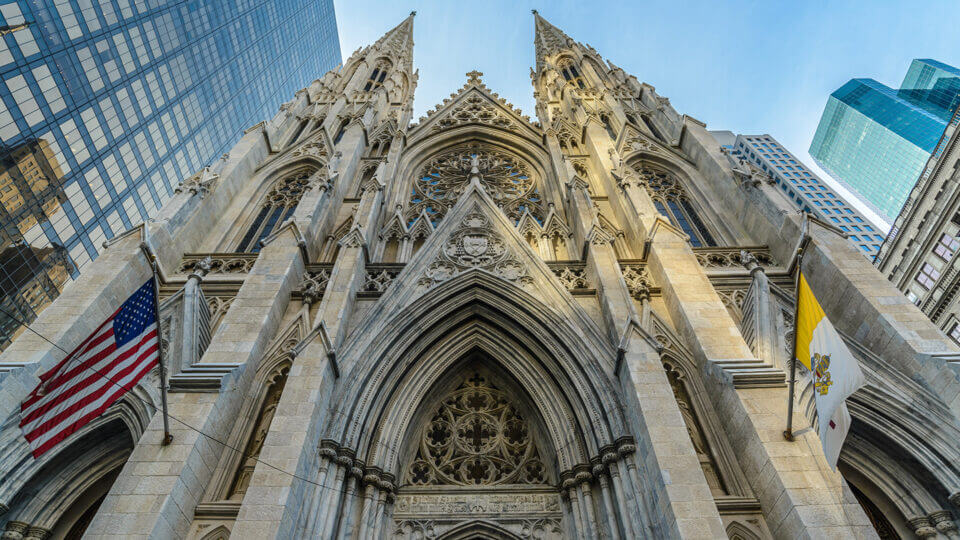
“We must face the reality that the prevalence of abortion is a manifestation of our distressed sociality and corrupted sense of mutual responsibility.”
With the publication of his third encyclical, Fratelli Tutti, earlier this month, Pope Francis has provided American Catholics with something extraordinary this election season. In the words of political theologian Professor Anna Rowlands, Francis has given us a chance “to stop and begin to look again” at the world around us and our role in shaping it. With a presidential election fast approaching, American Catholics ought to read and reflect upon Francis’s words and the invitation that he has extended to us—an invitation to step back and reflect upon our faith and how we are called to live out that faith as human beings and as citizens.
One of the fundamental propositions of Fratelli Tutti is that human dignity and human fraternity are deeply intertwined. He writes, “It is my desire that…by acknowledging the dignity of each human person, we can contribute to the rebirth of a universal aspiration to fraternity.” In other words, our acknowledgment of equal human dignity should lend itself to our embrace of fraternal love, of interconnectedness, of sociality.
This is a radical teaching, one that is at odds with how we tend to think of our human dignity. We often conceptualize our human dignity in an individuated form. We think of our human dignity in ways akin to negative liberty—as a “protection from” (murder, abuse, neglect); however, Francis teaches us that it is also a “calling to” (serving others, embracing interdependence, eschewing the false promise of self-sufficiency). Human dignity is the basis upon which we should establish not only our negative freedoms but also our positive duties to serve, love, and care for one another.
Francis does not deny our God-given status as individual rights-bearers, but he reminds us that our acknowledgment of this shared status can (and should) give way to a recognition of how interconnected, interdependent, and responsible to one another we truly are. Fratelli Tutti posits that the sanctity of our individuality and the truth of our connectivity are two sides of the same coin that is our universal, shared human dignity.
Fratelli Tutti and Abortion
At the risk of pressing the Pope into the service of partisan politics, it seems clear that all Catholics who are deliberating upon whom to vote for on November 3rd ought to spend some time reflecting and praying on this message of Fratelli Tutti—a message that emphasizes the relationship between our individual dignity and our interconnectedness. Specifically, though the issue of abortion is not a principal focus of Francis’s encyclical, Fratelli Tutti has a great deal of wisdom to offer Catholics who are weighing their vote and thinking about its impact on the prevalence of abortion in particular.
The injustice of abortion stems not only from the violation of the individual dignity of the unborn but also from the wrongful severance of the deep connection between mother and child.
As November 3rd fast approaches, perhaps it is time that we begin to reconceptualize the issue of abortion by placing just a bit less overt emphasis on the individual rights interests at stake and lending a bit more focus to our reality of interdependence.
For too long, when confronting the issue of abortion, Catholics have myopically focused on the rights of the unborn. This is understandable and in line with Church teachings like Pope Saint John Paul II’s Evangelium Vitae, which robustly and courageously defended the dignity of the unborn child. Of course, this Catholic commitment to the dignity of the unborn must be upheld, but Fratelli Tutti calls on us to re-examine the grounds and the nature of that commitment and the conception of human dignity that informs it.
The injustice of abortion stems not only from the violation of the individual dignity of the unborn but also from the wrongful severance of the deep connection between mother and child. And more often than not, this severance is a tragic, downstream consequence of the wider society’s cutting off of the mother from the social, economic, and emotional supports she needs to carry the child to term. Understood as such, abortion is an affront to human dignity, yes, but not only the individuated dignity of the unborn child; abortion is also an affront to the sociality, interconnectedness, and responsibility to which our shared dignity ought to give rise. Abortion denies the reality of our interdependence; it denies the reality that the mother has a duty to extend life and care to her child and that we, as a society, have a duty to both the mother and child, in turn.
When viewed through the lens of interdependence, abortion becomes not only an assault on individual rights but also a distressing manifestation of some of our worst political and social impulses. These are the sorts of impulses that push our life projects further into private goals and individual interests—goals and interests disassociated from the needs of our fellow citizens, especially the most vulnerable. These are the goals and interests that have propelled us along to our present, sorry state as a nation and as a world—a state, according to Pope Francis, where “the sense of belonging to a single human family is fading, and the dream of working together for justice and peace seems an outdated utopia. What reigns instead is a cool, comfortable and globalized indifference, born of deep disillusionment concealed behind a deceptive illusion: thinking that we are all-powerful, while failing to realize that we are all in the same boat.”
The 2020 Election
We must face the reality that the prevalence of abortion is a manifestation of our distressed sociality and corrupted sense of mutual responsibility. We now must begin the work of repair. For the time being, the most pressing question regarding that work relates to the political realm. If we are to re-orient our understanding of abortion in a manner informed by Fratelli Tutti, how should that affect our voting decisions as Catholics this November? It seems that the re-orientation I am putting forth here runs directly counter to the pro-life arguments that have been proffered against voting for former Vice President Joe Biden.
The most cogent, persuasive example of this anti-Biden line of argument has come from Ramesh Ponnuru and Princeton University Professor Robert George in National Review. Ponnuru and George persuasively argue that Catholics should consider the issue of abortion in isolation and candidates’ stances on its legality. Then, in light of the grave evil that is abortion, Catholics should give immense weight to those stances when deciding for whom to vote. This approach lends itself to a condemnation of Vice President Biden, who supports the legal right to abortion enshrined by the Supreme Court’s oft-disputed ruling in Roe v. Wade. In light of the widespread prevalence of abortion (though it has been decreasing steadily in the United States for quite some time) and the injustice thereof, this is certainly a position that reasonable people of good will may hold.
However, Ponnuru and George’s argument may belie the reality of abortion as described above—a reality of ruptured interdependence. Rather than a unique, particular evil, might it be necessary to view abortion as the tip of the iceberg of our decayed interdependence and disappearing mutual responsibility to one another? Perhaps Catholics are not called to focus on the issue of abortion in isolation. Instead, maybe we ought to step back and take stock of the erosion of our oneness in its entirety—and act and vote accordingly.
If we do not, we can slip into the trap of allowing genuine concern for the life and the dignity of the unborn to devolve into something else—a means of shirking one’s duties as a Catholic and as an American to think critically and act justly in the public square. Jeannie Gaffigan got to the heart of the matter recently in America magazine, writing: “Has the abortion issue become an idol for some Catholics at the expense of everything else?”
The reason Gaffigan’s question strikes such a chord is because the (ostensibly) pro-life presidential candidate, President Donald Trump, stands so clearly at odds with the respect for human dignity and embrace of interconnectedness to which Francis calls us as Catholics. Indeed, one cannot help but feel that Francis had President Trump himself in mind as he wrote the following in Fratelli Tutti:
“The best way to dominate and gain control over people is to spread despair and discouragement, even under the guise of defending certain values. Today, in many countries, hyperbole, extremism and polarization have become political tools. Employing a strategy of ridicule, suspicion and relentless criticism, in a variety of ways one denies the right of others to exist or to have an opinion. Their share of the truth and their values are rejected and, as a result, the life of society is impoverished and subjected to the hubris of the powerful. Political life no longer has to do with healthy debates about long-term plans to improve people’s lives and to advance the common good, but only with slick marketing techniques primarily aimed at discrediting others. In this craven exchange of charges and counter-charges, debate degenerates into a permanent state of disagreement and confrontation.”
President Trump has made sowing discord a governing philosophy. He is committed to fraying the ties that bind us as Americans to one another and our fellow humans beings, rather than building them up. Meanwhile, Vice President Biden, though an imperfect man with imperfect views on abortion, has placed unity and mutual responsibility at the very center of his campaign, and he continues unequivocally to do so. Perhaps Catholics should embrace the politics of unity, dignity, and interconnectedness, and have faith that doing so will help lay the groundwork for re-calibrating the abortion debate—reminding one another that this is not simply an irreconcilable conflict of rights but, rather, a question of how much we, as a society, value one another and our responsibilities to each other.
The path to this destination will not be marked by dog whistles, bloviation, division, and indecency. It will not be marked by four more years of President Trump. Without shirking their pro-life commitments, American Catholics should vote for Vice President Biden and work with him to help build up a society premised on our shared humanity, interconnectedness, and dignity. Only in this sort of society—one truly inspired by an all-encompassing culture of life—will the protection of the rights, dignity, and connectedness of the unborn, mothers, and all Americans be secure and long-lasting.
Thomas Koenig is a recent graduate of Princeton University and will be attending Harvard Law School in the fall of 2021. He can be found on Twitter @TomsTakes98











“President Trump has made sowing discord a governing philosophy.” Really? You don’t think defending himself from a 7 day a week/24 hour a day 4 year barrage of media coverage , much of which contained erroneous information had something to do with his approach? Take a look at the transcript of the speech made on the night he was elected in 2016 and tell me if you think he was looking to sow discord when he first assumed office. For the record, I never want to see Roe v Wade overturned, as it is the perfect middle ground between 2 extremes and a bridge between the religious and the secular, but I find your advice to vote for Biden over Trump if you’re a Catholic unsound, for reasons that I might expand upon in a rebuttal to your article.
Joe Biden spent nearly 5 decades in Washington and now he is the left wing’s hope for change? Biden is as responsible for sowing discord as anything Trump has done. Trump is not the origin of our divisions and Biden will not unite us. I am a registered Independent voter and I cannot wait to vote for Trump tomorrow. And I have no idea why this diatribe was listed as coming from the center, which it certainly does not.